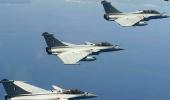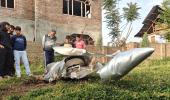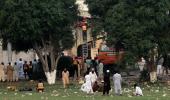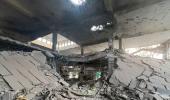'We will see whether there were losses or not, and whether the war aims were achieved. When the truth comes out, some may well be surprised,' says Dassault CEO.

Pakistan's claims of downing three Indian Air Force (IAF) Rafale combat aircraft in an aerial engagement during the May 7 strike on terror targets inside Pakistan under Operation Sindoor are incorrect, Eric Trappier, chief executive officer (CEO) of France's Dassault Aviation, the original equipment manufacturer of Rafale, has said.
Acknowledging that he was not exactly aware about the alleged combat losses during Operation Sindoor -- given that New Delhi has not communicated anything on the matter -- Trappier said in a French-language interview: “What we do know is that the claims made by the Pakistanis (three Rafales destroyed) are incorrect.”
He added: “We will see whether there were losses or not, and whether the war aims were achieved. When the truth comes out, some may well be surprised.”
Speaking last week to French magazine Challenges, ahead of the Paris Air Show, the Dassault Aviation CEO also asserted that combat aircraft are used to carry out a military mission, where success is defined by achieving objectives, not by having zero losses.
“During World War-II, no one claimed the Allies lost the war because they suffered troop losses.”
Trappier was responding to a question on whether the alleged loss of at least one Rafale during the aerial clash with Pakistan in early May indicated that the French-designed jet had reached its limits.
To a question on whether the Rafale remained among the best combat aircraft in the world, 20 years after entering service, Trappier said while it was complicated to claim any one aircraft was the best in absolute terms, he sincerely believed the Rafale was the best when it came to a single platform capable of conducting air-to-air missions, reconnaissance, air-to-ground strikes, nuclear missions, and carrier operations.
In that context, he added that it was better than the American Lockheed Martin F-35 stealth jet and far superior to all Chinese aircraft in the market.
However, he did acknowledge: “It's obvious that in a one-on-one aerial engagement with an F-22 (US Air Force stealth air superiority fighter), it's going to be tough for the Rafale.”
The Dassault Aviation CEO stressed that the Rafale “perfectly meets” the needs of both the French armed forces and the countries that purchased it.
On the sidelines of the Shangri-La Dialogue security forum in Singapore last month, Chief of Defence Staff (CDS) General Anil Chauhan had said India “rectified” its tactics after the May 7 losses and gained an advantage over Pakistan during the four-day conflict.
These were the CDS's first remarks to international media since India launched Operation Sindoor in retaliation of the April 22 Pahalgam terrorist attacks, which New Delhi said had cross-border linkages.

Responding to questions about the loss of Indian jets, the CDS told an international news agency that while losses had occurred, India had carried out strikes inside Pakistan with “pinpoint accuracy, some even to a metre, to whatever was our selected mean point of impact”. General Chauhan added that India had achieved its objectives.
In an interview with another news agency, General Chauhan said that Pakistan's claim of shooting down six Indian fighter jets was “absolutely incorrect”, but did not elaborate on India's losses.
The CDS said that Indian forces rectified their tactics and returned on May 7, 8, and 10 in large numbers to strike air bases deep inside Pakistan, penetrating all its air defences with impunity and carrying out precision strikes. He added that the IAF “flew all types of aircraft with all types of ordnance on the (May) 10th”.
In a briefing a day after the May 10 pause in Operation Sindoor, under an understanding reached between the militaries of India and Pakistan, Director General of Air Operations Air Marshal A K Bharti had said that all IAF pilots who took part in the operation were back home.
He did not deny losses but underscored that the aim of the operation had been achieved.
Responding to a media query on the possible loss of IAF aircraft during the operation and subsequent military exchanges with Pakistan, Air Marshal Bharti said: “We are in a combat scenario, and losses are a part of combat. The question you must ask us is, have we achieved our objective of decimating the terrorist camps? And the answer is a thumping yes. And the results are for the whole world to see.”
He added: “As for the details of how many numbers or which platform we lost, at this point in time, I would not like to comment on that because we are still in a combat situation. If I comment on anything, it will only be an advantage for the adversary.”
Earlier this month, it was announced that, in a first, the fuselage of the Rafale combat aircraft would be manufactured in India -- for both domestic and global markets -- after Dassault Aviation and Indian private sector aerospace and defence major Tata Advanced Systems Limited (TASL) announced a tieup to manufacture key structural sections of the Rafale at a production facility TASL would set up in Hyderabad, Telangana.
In April, in the country's largest ever fighter jet acquisition, India signed an intergovernmental agreement (IGA) worth around ₹64,000 crore with France to procure 26 Rafale-Marine combat aircraft to bolster the Indian Navy's firepower.
The IAF earlier acquired 36 Rafale jets under a ₹60,000 crore IGA with France signed in September 2016.
Feature Presentation: Rajesh Alva/Rediff











